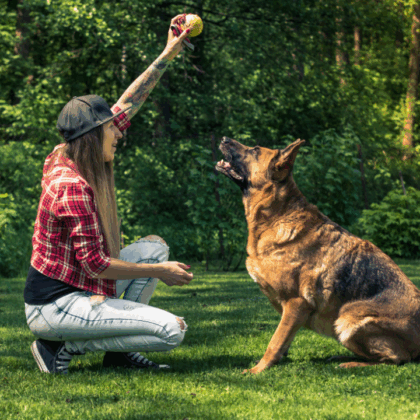Inspired by a clip from her talk at the Aggression in Dogs Conference – Suzanne decided to write a blog based on how she uses Attentive Cooperation/Puppy Politeness Poker with aggressive dogs – you can watch that clip here on Facebook or Instagram.
Here’s what we know about reactive and aggressive dogs: confrontation escalates. Physical force threatens. And when a dog feels threatened, his options narrow to fight or flight. If you’ve got him on a leash, flight’s off the table.
This is where Puppy Politeness Poker (PPP) offers something different entirely. Rather than controlling the dog’s body and simply managing and preventing, PPP focuses on working with the dog’s mind.
The Problem with Physical Management
Equipment doesn’t teach. A collar and leash can manage a reactive dog in the moment, but management isn’t education. The dog learns nothing about self-regulation, nothing about choosing cooperation over reaction.
Worse, physical management can backfire spectacularly. Dogs learn to dance out of reach. They associate the approach of triggers with collar grabs and physical restraint, adding handler-induced stress to an already loaded situation. Some dogs, like my adopted dog Badger, learn to threaten anyone reaching for their collar because that’s always preceded something unpleasant.
A Non-Confrontational Alternative
Puppy Politeness Poker works because there’s nothing for the dog to fight. When the dog is uncooperative, the real life reward simply doesn’t happen. You and your marvelous thumbs walk away for a bit. No threat. No confrontation. No escalation.
For reactive dogs, this approach is safety itself. These dogs often have serious trust issues with humans. They may have been physically forced, corrected harshly, or flooded with triggers. They’re primed for conflict.
PPP says: “I’m not going to make you do anything. But if you want this thing you care about, here’s how to earn it.”
Building Self-Regulation in Aroused Dogs
The strength of PPP for reactive dogs lies in using the dog’s own arousal to teach self-regulation. Your reactive dog’s arousal spikes at the sight of his food bowl, at the sound of the doorbell, at the jiggle of the leash. Traditional approaches try to suppress that arousal through correction or distraction.
PPP acknowledges the arousal and teaches the dog to modulate it. “Yes, you’re excited (or anxious, or ramped up). Now dial down into your Think & Learn Zone so you can process what I’m asking.”
This is practiced first in lower-arousal situations throughout the day. The dog learns the skill when stakes are low. Opening the crate door. Setting down the food bowl. Stepping toward the back door. Then, as arousal increases in more challenging situations, the dog has neural pathways already established for “aroused but thinking.”
Starting Where Your Client’s Dog Is
For trainers, this means meeting each reactive dog exactly where he is. A dog who can’t think when he sees his food bowl needs to start there. A dog who loses his mind at the back door needs to practice there first. These aren’t the triggering situations that brought them to you, but they’re arousing enough to matter to that dog.
You’re building thousands of successful repetitions of “I’m aroused but I can still think and choose cooperation.” All without confrontation. All while the dog feels increasingly in control of his world.
The Handler’s Role
For handlers dealing with reactive dogs, PPP teaches something crucial: you don’t need physical strength or perfect timing or expensive equipment. You need clarity, consistency, and the willingness to use your thumbs wisely.
Your clients learn to read their dogs better. They learn to set fair expectations. They learn that improvement comes not from controlling the dog’s body but from engaging his mind and earning his cooperation.
When I worked with clients whose dogs had bitten them, PPP provided a safe path forward. No collar grabs. No physical confrontation. Just clear expectations, fair consequences, and a dog learning that cooperation works better than conflict.
Want to learn more about Attentive Cooperation and Puppy Politeness Poker? You can take the Course HERE.
Or do you want to learn more about using Puppy Politeness Poker and all of Suzanne’s Relationship Centered Training Skills to help reactive dogs? Sign up here to find out when the Reactivity Repair Kit opens!

